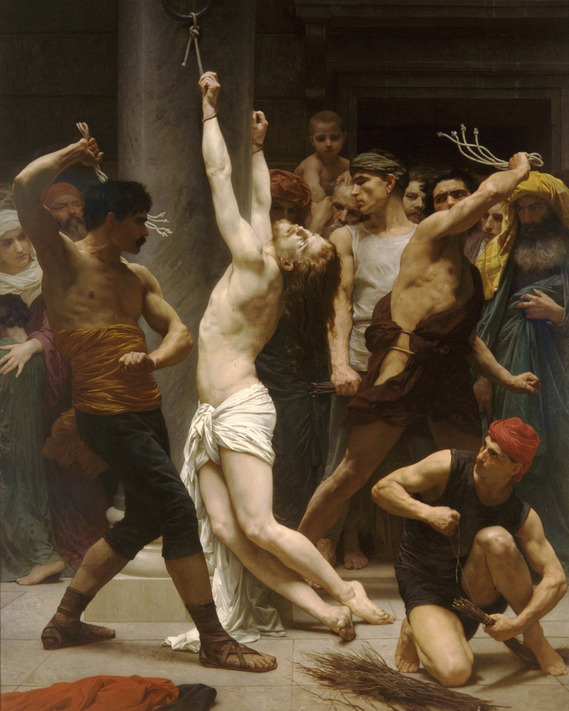Born, lived, died, and ....
Why didn’t Jesus come as the King of the world among a powerful nation, and an exceptional throng of people that could influence a worldly empire? Perhaps the plan was to evolve differently, but the tribal people of God’s choosing weren’t up to the task. This story of a people of history selected to be the beacon of the God of the universe cannot convince anyone that Jesus is the Lord of the universe, or that he sat and still does as the second person of the Holy Trinity. The sorry story of a failed people and the violent death of their Messiah, though, sets up the background for what happened next.
Death has been conquered
http://www.usccb.org/bible/readings/113016.cfm
Romans 10:9-18
Matthew 4:18-22
Why does scripture focus so intently upon Jesus, the Christ? An all powerful and mighty God, a Father of us all, who made the universe and everything in it isn’t enough? The Spirit of God who travels through the wind and whispers into our ears all that the Father wants us to do and accomplish isn’t enough?
It’s not so much that something could be wrong with the reality of a God who created everything and lives with us all in his Spirit, as it is that God wants more than to be recognized. He wants to be among us. He had decided all along that he wanted to be one of us.
So, no says the faith that our Jewish and Christian ancestors have told us. God the Father and the Holy Spirit are the primary part of the story. We must also have this other characteristic of God as our human Lord. We must believe and follow a flesh and bones being like us, as our Lord for all eternity.
Not to be skipped is our recognition that the concept of God as Father, and the location of the Holy Spirit as living within us, came from the words and teaching of Jesus. He clearly defined the person of God as Father, and the Spirit of God as Holy. No one else told us this.
Not to be ignored is that before Jesus was born the almighty and powerful God and his awesome Spirit weren’t just notions but were physically recognized entities revealed in pillars of fire and cloud, and in incredible shows of warfare and miraculous rescues. Angels, too, announced God’s presence. God himself spoke to prophets, and called himself “I Am.” Granted, from the earliest records of the Hebrew scriptures the Messiah, the Christ, was foretold. But the shocking reality that Jesus was among a trinity of persons was not verbalized until Christ himself claimed, "I am." Until he said it, no one knew the assurance of Jesus' divinity.
Unlike the God of fire and cloud who’s voice dropped people to their knees, spread the waters to free people and drowned armies, Jesus healed outcasts and cured peasants. Unlike his Holy Spirit who touched every living thing not just over the eons and around the globe, but throughout the universe, this Jesus bar Joseph led a regionally bounded and lackluster life growing up as a carpenter’s stepson. After 30 years of an ignominious existence, Jesus revealed his divinity and projected his Lordship by spending a mere three years on a mission with a blue collar band of unexceptional people in a place the size of a few counties in Colorado.
This Jesus amazed and rankled a tiny portion of one tiny planet. He ruffled the religious leaders of an odd-looking, ritual obsessed, and politically and militarily failed small community of tribal origin. These folks held no land of their own and their leaders had severely restricted powers. His interactions and miraculous activities took place under an unimportant umbrella in a concealed corner of one empire. During his lifetime, his efforts intrigued only a couple of local Roman officials curious of his parochial celebrity. Without much consideration and less legal weight, they acquiesced to unreasonable clerics and a protesting hoard of their supporters. They crucified Jesus like a common criminal, mocked as a King of not just Jews, but also the Romans and Greeks. He was just another annoying and forgotten execution.
Why didn’t Jesus come as the King of the world among a powerful nation, and an exceptional throng of people that could influence a worldly empire? Perhaps the plan was to evolve differently, but the tribal people of God’s choosing weren’t up to the task. This story of a people of history selected to be the beacon of the God of the universe cannot convince anyone that Jesus is the Lord of the universe, or that he has sat and still does as the second person of the Holy Trinity. The sorry story of a failed people and the violent death of their Messiah, though, sets up the background for what happened next.
Jesus rose from the dead. His prophecy and promise during his missionary life came to fulfillment. This is all that matters to a world of evidentiary truth. Show me that this man is Lord, say the interpreters of history; and, ardent study with the gift of faith will do just that. To rise from the dead as a resurrected being with capabilities and powers that astounds science stamps a divine seal on the conquerer of death. The risen Jesus countermands a decaying premise of creation's design. Jesus turns upside down the foundation of creation. He rose so that everyone for all time will have a marker that distinguishes him from any other man, and exposes a different eventuality. The original, and only logical expectation of a holy creator is that all creation will have eternal life. To deny that, in the face of Jesus' revolutionary exclamation of life forever under his tutelage, relegates us to a doomed, deadly end.
“If you confess with your mouth that Jesus is Lord, and believe in your heart that God raised him from the dead, you will be saved.” Romans 10:9
The simple truth of Jesus as Lord shown in the dusty countryside of Jerusalem is told today in the same parochial and insignificant fashion. We humans, in our leadership and world view, remain a failed partner with Jesus, the Father of us all, and the Holy Spirit who yearns to live in us. Regardless of the concentration upon the glorious Vatican compound and the remarkable cathedrals that dot every city on the globe, the truth of Jesus as Lord, as the risen Son of God, is primarily told on the streets, in the neighborhoods, on automobile bumpers, and in the common gathering places of the world. The vast majority of Christian testimony takes place beneath and outside of the pantheons of government councils, executive board rooms, and mansions of the wealthy.
And still, the testimony powerfully transforms the population.
Imagine two old men and two old women, Christ followers, sitting together in a booth at a restaurant, reflecting on their lives, and talking about God. They begin by blessing their meal in the name of the God who lives, offering up their thanks to “Christ our Lord, Amen.” They discuss their families and mention the ones that are sick, upset, lost, anxious, and maybe dying. They casually and sincerely add all these people to their prayers, mouthing “Dear Lord,” and “Lord help them,” while they drink coffee, and tea, and enjoy each other’s company.
They are witnesses, testifying among each other, and in public. “No one who believes in him will be put to shame.” In almost all such cases of shared faith, the restaurant managers and serving staff, bow their hearts to the faithful.
All of our thinking and attention must be formed and focused toward a singular relationship to one man, scripture tells us. We gather in faith, hold hands in prayer, and object to Jesus insults by changing the reception on our radios, our televisions, and the internet. The airwaves and digital space offers plenty of faithful options and opportunities. We have even chosen to teach our children at home when no other choices exist. The effect of eternal life is unstoppable.
So, many of us wear crosses to remind us, some attached to rosaries, and others hanging from our rear view mirrors. Our churches display the cross of the man, and we enter in packs and droves to make our statement with our feet. Our churches are everywhere, whether common in their space or glorious in their steeples.
While many of us may struggle to grasp that an all powerful and loving God exists, the seemingly complicated story of an obscure birth and life and death has morphed into a perfectly good notion of the almighty that has crashed through the barrier of the invisible. We shake each other’s hand at our services and claim the Spirit's urging. “Christ be with you.”
When someone curses, “Jesus Christ,” we murmur the added words and finish their sentence with, “is Lord.” When we see old friends and they exclaim their shock at seeing us, “Jesus Christ, it’s you!” We answer, “No. It’s just me, John. But thanks for seeing him in me.”
God insists that the basis for everything we should believe rests upon this single, central, reoccurring statement that Jesus is Lord. He’s the Lord of me, he’s the Lord of all. Lordy, Lordy, Lordy.
We are told that at the core of our being, in our heart, that our acceptance must be resolute and confident enough to confess that belief out loud, and the most simple expressions are the ones that course through society where two or three are gathered.
We do this, because, “Their voice has gone forth to all the earth, and their words to the ends of the world.”

